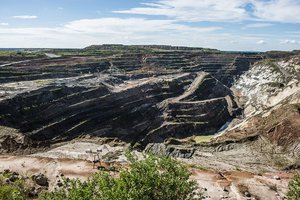In Cape Town this week, two very different conferences on the mining sector have been taking place. The annual African Mining Indaba (industry indaba) brings together the global mining industry and African governments to showcase the types of investment opportunities that make extraction and trade in minerals a billion dollar industry. Across town, the Alternative Mining Indaba (AMI), which was set up due the historical exclusion of civil society from the main conference, reveals the often catastrophic human and environmental impacts of the mining industry.
Two sides of the mining story
The division between the two events underscores two sides of the mining sector and the operational opacity which its corporate contingent often strives to maintain. Community activists at AMI catalogue some of the devastating consequences of mining on the lives of their communities. For example, accounts of children suffering painful skin conditions linked to polluted water sources or of the violence meted out by private and state security forces in mining areas are commonplace. Meanwhile, champagne sits on ice ahead of the lavish parties thrown around town after a frenetic day of wheeling and dealing at the industry indaba. To witness the harrowing human stories shared at AMI side by side with the extravagance of a mining industry evening soiree makes for a deeply uncomfortable and shameful contrast.
This year, alongside topics such as the ‘investment battlefield’ and ‘business matchmaking’, ‘sustainable development’ has been added to the industry mining indaba’s packed agenda. Slots on responsible business at the conference could be read as a step in the right direction, as could yesterday’s statement of solidarity with the AMI by industry stakeholders. But these are meagre offerings on a topic which should be at the forefront of the mining industry’s activities. While paying lip service to protecting human rights and the environment, industry still largely excludes civil society and affected communities from the conversation.
A glance at the mining news stories that have hit the headlines over the past year indicates why the industry must take the concerns of affected communities a lot more seriously.

Access
roads leads to the deep open pit mine at the Nchanga copper mine, operated by
Konkola Copper Mines Plc, in Chingola, Zambia, 2016. Waldo Swiegers/Bloomberg via Getty Images
Signs of a new era for corporate accountability ?
A more global spotlight has been shone on the dark underbelly of the mining industry over the past year. Recent stories about charges and court cases linked to corporate accountability for serious harms experienced by communities affected by mining have featured some of the industry indaba’s major players.
Vedanta, a sponsor of this year’s industry indaba, hit the headlines in 2019 when the UK Supreme Court ruled that 1826 Zambian villagers could sue Vedanta and its Zambian subsidiary Konkola Copper Mines (KCM) in the UK over alleged damage to their land and water from copper mining effluent, and claims that this effected their health, causing illnesses and permanent injuries. The decision was a landmark for the legal treatment of parent-subsidiary relationships in UK law. This could have wide-ranging implications for the understanding of corporate accountability for parent companies, ultimately leading, one might hope, to greater care to respect human rights and mitigate risks of harm.
Another regular indaba attendee, international mining giant Vale, made the news after the collapse of a tailings dam in Brumadinho, in the Brazilian state of Minas Gerais, killed 250 people in January 2019. Video footage of collapse unfolding revealed the shocking scale of the destruction. Last month it was announced that Brazilian prosecutors have filed charges against 16 people, including murder charges, in relation to the disaster. The individuals charged include the former CEO of Vale. While impunity for harms is a trend that has long been associated with the mining industry, in this case at least, it may not be a story of business as usual for those responsible.

Malvina Firmino Nunes, who lost her son in the January 2019 Brumadinho dam collapse, holds a portrait of him, almost one year on from the disaster. Douglas Magno/AFP via Getty Images
These stories, and many more that have garnered less attention, illustrate the devastation that can be wrought by the mining industry. It is perhaps not surprising that discussion of human rights and environmental protections at the civil society-led AMI focus not only on how mining can be carried out more responsibly, but whether it should be carried out at all. The extraction, trade and transport of minerals has long been recognised as a business linked to serious risks along the supply and value chain. It is often the poorest and most vulnerable that bear the brunt of harm, a world away from the luxurious industry-sponsored parties in Cape Town tonight.
The race for clean energy minerals
The increasing drive for minerals used in renewable energy is a hot topic at the industry indaba this year. As part pf the transition to a low-carbon economy, the OECD has predicted that by 2060 global metal use will more than double.
The race for clean tech minerals has been described—ominously—as ‘the new scramble for Africa’, as companies compete for the minerals that will fuel the technology of the future. Already the risks associated with cobalt, one of the propellers of the clean tech revolution, have come under the spotlight, through links to child labour in the Democratic Republic of Congo (DRC). It would be a gross contradiction if the drive for more sustainable energy is fuelled by human rights and environmental abuses in producer countries.
The need for responsible sourcing
Global Witness has long investigated and exposed links between minerals and human rights abuse, environmental destruction and corruption in African countries including DRC, Republic of Congo, Zimbabwe and Angola, and across the globe.
Responsible business is about how companies do business, through the policies and practices they adopt to prevent human rights and environmental harms linked to their business. International guidelines for responsible mineral sourcing of minerals have been in place for years. But the industry’s dire track record is testament to its ongoing failure to put responsible conduct at the heart of its operations, and above the pursuit of profit.
Without a systemic shift, any gains made in the battle against climate change will come with significant human and environmental cost. Meaningful inclusion of those directly affected by the unacceptable face of the mining industry is a fundamental first step. AMI takes place just a few kilometres away from the industry indaba at Cape Town Convention Centre, yet it feels like an ocean apart. A sea-change is long overdue.